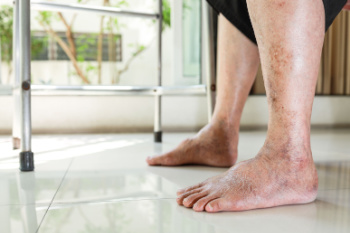Connect With Us
Blog
Items filtered by date: January 2025
Do Your Child's Feet Hurt?
Causes and Symptoms of Heel Pain

Heel pain is a common issue that can significantly affect daily activities. The most frequent cause of heel pain is plantar fasciitis, which is an inflammation of the tissue that connects the heel to the toes. Symptoms typically include sharp pain in the heel, especially when taking the first few steps in the morning or after prolonged periods of sitting. Heel pain can also result from other conditions, such as Achilles tendonitis, heel spurs, or bursitis. Common causes include overuse, wearing improper footwear, obesity, or tight calf muscles. Treatment for heel pain often begins with conservative measures such as rest, stretching exercises, and wearing supportive shoes or custom orthotics. Nonsteroidal anti-inflammatory drugs can help manage pain and inflammation. In severe cases, a podiatrist may recommend corticosteroid injections, or even surgery to address underlying issues. If you have heel pain, it is suggested that you schedule an appointment with a podiatrist.
Many people suffer from bouts of heel pain. For more information, contact Dr. Royall of Mountain View Foot & Ankle Clinic. Our doctor can provide the care you need to keep you pain-free and on your feet.
Causes of Heel Pain
Heel pain is often associated with plantar fasciitis. The plantar fascia is a band of tissues that extends along the bottom of the foot. A rip or tear in this ligament can cause inflammation of the tissue.
Achilles tendonitis is another cause of heel pain. Inflammation of the Achilles tendon will cause pain from fractures and muscle tearing. Lack of flexibility is also another symptom.
Heel spurs are another cause of pain. When the tissues of the plantar fascia undergo a great deal of stress, it can lead to ligament separation from the heel bone, causing heel spurs.
Why Might Heel Pain Occur?
- Wearing ill-fitting shoes
- Wearing non-supportive shoes
- Weight change
- Excessive running
Treatments
Heel pain should be treated as soon as possible for immediate results. Keeping your feet in a stress-free environment will help. If you suffer from Achilles tendonitis or plantar fasciitis, applying ice will reduce the swelling. Stretching before an exercise like running will help the muscles. Using all these tips will help make heel pain a condition of the past.
If you have any questions please contact our office located in Lehi, UT . We offer the newest diagnostic and treatment technologies for all your foot and ankle needs.
Understanding Peripheral Neuropathy

Peripheral neuropathy is a condition resulting from damage to the peripheral nerves, which connect the brain and spinal cord to the rest of the body. This condition often causes tingling, numbness, and burning sensations, particularly in the feet. Over time, it can lead to muscle weakness, loss of coordination, and heightened sensitivity to touch or pain. Common causes include diabetes, vitamin deficiencies, infections, certain medications, and physical injuries. Poor blood flow and prolonged high blood sugar in diabetic patients can worsen nerve damage, making early intervention vital. Treatment focuses on managing symptoms and addressing the underlying cause. Medications, targeted exercises, and lifestyle changes, such as maintaining healthy blood sugar levels or quitting smoking, can slow progression and improve quality of life. If you suspect peripheral neuropathy, it is suggested that you see a podiatrist for an accurate diagnosis and personalized care.
Neuropathy
Neuropathy can be a potentially serious condition, especially if it is left undiagnosed. If you have any concerns that you may be experiencing nerve loss in your feet, consult with Dr. Royall from Mountain View Foot & Ankle Clinic. Our doctor will assess your condition and provide you with quality foot and ankle treatment for neuropathy.
What Is Neuropathy?
Neuropathy is a condition that leads to damage to the nerves in the body. Peripheral neuropathy, or neuropathy that affects your peripheral nervous system, usually occurs in the feet. Neuropathy can be triggered by a number of different causes. Such causes include diabetes, infections, cancers, disorders, and toxic substances.
Symptoms of Neuropathy Include:
- Numbness
- Sensation loss
- Prickling and tingling sensations
- Throbbing, freezing, burning pains
- Muscle weakness
Those with diabetes are at serious risk due to being unable to feel an ulcer on their feet. Diabetics usually also suffer from poor blood circulation. This can lead to the wound not healing, infections occurring, and the limb may have to be amputated.
Treatment
To treat neuropathy in the foot, podiatrists will first diagnose the cause of the neuropathy. Figuring out the underlying cause of the neuropathy will allow the podiatrist to prescribe the best treatment, whether it be caused by diabetes, toxic substance exposure, infection, etc. If the nerve has not died, then it’s possible that sensation may be able to return to the foot.
Pain medication may be issued for pain. Electrical nerve stimulation can be used to stimulate nerves. If the neuropathy is caused from pressure on the nerves, then surgery may be necessary.
If you have any questions, please feel free to contact our office located in Lehi, UT . We offer the newest diagnostic and treatment technologies for all your foot care needs.
Systemic Sclerosis and Foot Health

Systemic sclerosis, or scleroderma, is a rare autoimmune disease that causes skin and connective tissues to harden and tighten, often impacting the feet. This condition affects blood vessels and internal organs as well, leading to complications in various body areas. When systemic sclerosis targets the feet, it can lead to thickened skin, limited mobility, and poor circulation, increasing the risk of ulcers and infections. Although it primarily affects women, typically between the ages of 30 and 50, anyone can develop systemic sclerosis. Risk factors include genetic predisposition, environmental exposures, and certain infections. Foot care for those with systemic sclerosis includes moisturizing, wearing proper footwear, and regular foot inspections. If you have this condition, it is strongly suggested that you visit a podiatrist for tailored care. This type of specialist can help with custom orthotics, ulcer prevention, and circulation support, improving foot comfort and preventing complications related to this challenging condition.
When dealing with systemic disease of the feet, it is extremely important to check the affected areas routinely so that any additional problems are caught quickly. If you have any concerns about your feet and ankles contact Dr. Royall from Mountain View Foot & Ankle Clinic. Our doctor will assist you with all of your podiatric needs.
Systemic Diseases of the Feet
Systemic diseases affect the whole body, and symptoms usually are displayed in the feet. This condition can make a patient’s ability to walk unbearable. Systemic diseases include gout, diabetes mellitus, neurological disorders, and arthritis.
Gout – is caused by an excess of uric acid in the body. Common symptoms include pain, inflammation, and redness at the metatarsal/phalangeal joint of the base big toe. Gout can be treated by NSAIDs to relieve pain and inflammation, and other drugs that lower the acid levels in the body.
Diabetes mellitus – is an increase in the level of blood sugar that the body cannot counteract with its own insulin. Failure to produce enough insulin is a factor in Diabetes.
Diabetes of the Feet
Diabetic Neuropathy – may lead to damaged nerves and affect the feet through numbness and loss of sensation.
Peripheral Vascular Disease – can restrict the blood flow to the feet, and often times lead to amputation of the feet.
If you have any questions please feel free to contact our office located in Lehi, UT . We offer the newest diagnostic and treatment technologies for all your foot and ankle needs.
Common Causes of Swollen Ankles and Effective Relief Methods

Swollen ankles are a common issue that can arise from various causes, including poor circulation, injury, or fluid retention. Conditions such as heart, kidney, or liver disease can lead to fluid buildup in the lower extremities, causing swelling. Prolonged standing or sitting, especially during long flights or road trips, can also contribute to ankle swelling. Injury, such as sprains or fractures, often results in swelling as the body reacts to trauma. To relieve swollen ankles, elevating the feet can help reduce fluid accumulation. Applying cold compresses can reduce swelling and provide pain relief. Wearing compression socks and staying active by walking or moving the feet regularly can improve circulation. Reducing salt intake and staying hydrated also helps prevent fluid retention. If you have swollen feet and ankles, it is suggested that you consult a podiatrist who can determine what the cause is, and offer appropriate relief and management solutions.
Swollen feet can be a sign of an underlying condition. If you have any concerns, contact Dr. Royall of Mountain View Foot & Ankle Clinic. Our doctor can provide the care you need to keep you pain-free and on your feet.
Swollen feet are a common ailment among pregnant women and people who stand or sit for extended periods. Aging may increase the possibility of swollen feet and patients who are obese often notice when their feet are swelling too. There may be medical reasons why swollen feet occur:
- Phlebitis - A condition that causes the veins to become inflamed and can also cause leg pain.
- Liver disease - This may lead to low blood levels of albumin which is a protein. This can cause fluid in the blood to pass into the tissues and several areas of the body can become swollen.
- Heart failure - When the heart doesn’t pump properly the blood that is normally pumped back to the heart can pool in the veins of the legs causing swollen feet.
- Kidney disease - One of the main functions of the kidneys is releasing excess fluid in the body. This type of condition can make it difficult for the kidneys to function properly, and as a result the feet may become swollen.
- Deep-vein thrombosis (DVT)- This is a serious condition where blood clots form in the veins of the legs. They can block the return of blood from the legs to the heart which may cause the feet to swell. It is important to be treated by a podiatrist if this condition is present.
Swollen feet can also be caused by bone and tendon conditions, including fractures, arthritis, and tendinitis. Additionally, there may be skin and toenail conditions and an infection may cause the feet to swell. Patients who take medicine to treat high blood pressure may be prone to getting swollen feet.
Many patients elevate their feet to help relieve the swelling and this is generally a temporary remedy. When a podiatrist is consulted the reason behind the swelling can be uncovered and subsequently treated.
If you have any questions please feel free to contact our office located in Lehi, UT . We offer the newest diagnostic tools and technology to treat your foot and ankle needs.
Blog Archives
- April 2025
- March 2025
- February 2025
- January 2025
- December 2024
- November 2024
- October 2024
- September 2024
- August 2024
- July 2024
- June 2024
- May 2024
- April 2024
- March 2024
- February 2024
- January 2024
- December 2023
- November 2023
- October 2023
- September 2023
- August 2023
- July 2023
- June 2023
- May 2023
- April 2023
- March 2023
- February 2023
- January 2023
- December 2022
- November 2022
- October 2022
- September 2022
- August 2022
- July 2022
- June 2022
- May 2022
- April 2022
- March 2022
- February 2022
- January 2022
- December 2021
- November 2021
- October 2021
- September 2021
- August 2021
- July 2021
- June 2021
- May 2021
- April 2021
- March 2021
- February 2021
- January 2021
- December 2020
- November 2020
- October 2020

